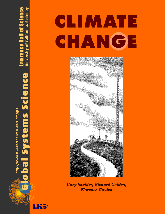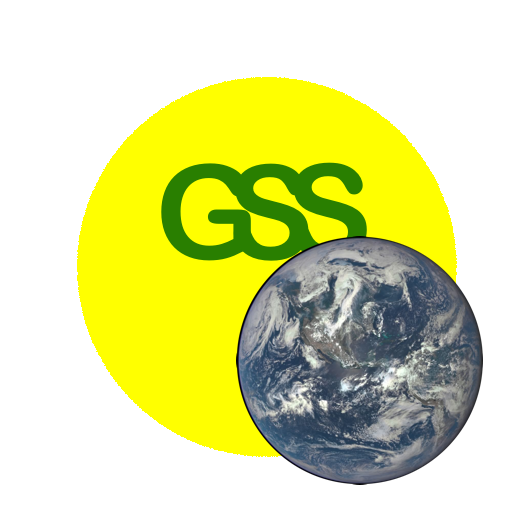Climate Change

CLIMATE CHANGE addresses the controversial question of how human activities may be changing Earth’s climate. See Overview.
Contents
Overview
Climate Change takes students on a “field trip” to Mauna Loa Observatory where they see how scientists have measured carbon dioxide in the Earth’s atmosphere since 1957. They graph and interpret data from Mauna Loa and other observatories which led to the prediction, in 1988, that changes in our atmosphere will cause the entire globe to gradually warm up. They also measure carbon dioxide in the laboratory to find out how much is contained in a sample of human breath and car exhaust. The Guide goes on to show how the discoveries at Mauna Loa have been challenged by other scientists in the early 1990’s, and discusses the consensus of opinion about global climate change that finally emerged in 1995. The Guide identifies scientific questions which still remain unanswered, and involves students in thinking about the economic, political, and ethical implications of regulating human activities to reduce the likelihood of global climate change.
General Resources for Climate Change:
100 Views of Climate Change (Colorado State University) – archive has recorded lectures on climate change.
- The Human Face [of climate change]
- The Big Picture
100.org – see The Solutions Project – http://thesolutionsproject.org …specific plans, by locale, for energy mixes that are 100% renewable energy.
Alliance for Climate Education – https://acespace.org – 2016 initiative: Our Climate Our Future (http://www.ourclimateourfuture.org), a multimedia experience that educates young people about the science of climate change and empowers them to take action. It brings the ACE Assembly on climate science and solutions online, with dynamic animation, music, video and interactivity. Teacher resources:
• Climate science, told through animation
• Stories from young people across the country
• Innovative climate solutions
“Americans and Climate Change — Closing the Gap Between Science and Action” – an interesting book that looks at American attitudes around this issue. It’s a synthesis of insights and recommendations from the 2005 Yale School of Forestry & Environmental Studies Conference on Climate Change. © 2006 Free download.
Animations – https://www.climatecommunication.org/news/new-animations/
Climate Central – https://www.climatecentral.org/
- Resources – https://www.climatecentral.org/resources
- Surging Seas (clickable map) – https://sealevel.climatecentral.org/
- U.S. Temperature Trends (The Heat Is On) – https://www.climatecentral.org/news/the-heat-is-on/
Climate Change Negotiations Simulation—World Climate https://www.climateinteractive.org/tools/world-climate/
Environmental Protection Agency (EPA) Climate Change page.
Haiku on climate change – http://www.sightline.org/2013/12/16/the-entire-ipcc-report-in-19-illustrated-haiku/
Insurance and climate change – articles from MoneyGeek:
- Navigating Climate Change and Insurance as a Homeowner
- Cities With the Most (& Least) Climate Risk Today
Interactives
- Carbon Dioxide and the Carbon Cycle
- Earth’s Energy Flows and Climate
- Impacts of Climate Change in the Pacific Region
Lots of interesting material on the subject of Climate Change may be found on the website of Stephen H. Schneider at Stanford University.
National Center for Science Education website “Long respected for its work in defending and supporting the teaching of evolution in the public schools, in 2012 NCSE launched this new initiative to defend and support the teaching of climate change.”
NASA climate education resources – climate.nasa.gov
News and Blogs
- https://climate.nasa.gov/news
- Feature: “A Breathing Planet, Off Balance”
- Feature: “Seven Case Studies in Carbon and Climate”
- Earth Right Now Blog
Lessons and Activities
- Climate Change Lessons for Educators
- Climate Change Activities for Students
- CarbonCycle Lessons for High School
Multimedia and Interactives
- NASA’s Earth Now App
- Infographic: “A Breathing Planet, Off Balance”
- Carbon and Climate Telecon
- Carbon and Climate Discussion at Maryland Science Center
- Visualizations
Facts and Figures
Websites
Join the Conversation
- Reddit AMA: “We’re NASA scientists studying the role of carbon in our planet’s climate. Ask us anything!”
- Follow @EarthVitalSigns on Twitter
- Follow NASA Climate Change on Facebook
National Research Council (NRC) / National Academy of Sciences
- Climate Change: Lines of Evidence
- Video Series Summarizing the State of Climate Science Research
NOAA
- Climate.gov
- National Centers for Environmental Education (NCEI) – https://www.ncei.noaa.gov/
- NCEI News – https://www.ncei.noaa.gov/news
- Climate Services
- Monthly RSS Feed from NOAA about the US Climate System : https://www.ncdc.noaa.gov/sotc/. Sign up for the feed and get them in your mailbox.
- Video – Climate Change: Impacts, Solutions and Perceptions – What scientific evidence exists that Earth’s climate is changing? What’s the difference between climate change and climate variability? How does a changing climate affect people and the natural environment? What can we do to lessen and adapt to the impacts of these changes?
Our Common Earth – http://www.ourcommonearth.org/ – a website devoted to information about climate change, organized so visitors can look for articles by topics and/or from their value perspectives (liberal, conservative, secular, faith-based, youths, elders).
RealClimate.org – http://www.realclimate.org – see online lectures:
http://www.realclimate.org/index.php/archives/2012/12/online-video-lectures-on-climate-change/
Schools for Climate Action – http://www.schoolsforclimateaction.org/ (S4CA)
Simulations & Games list from UCAR.
The Solutions Project – http://thesolutionsproject.org – …specific plans, by locale, for energy mixes that are 100% renewable energy.
Wordtips—Activities To Teach About Environmental Issues
- The Paris Agreement
https://unfccc.int/process-and-meetings/the-paris-agreement/the-paris-agreement - Solar is now ‘cheapest electricity in history’, confirms IEA
https://www.carbonbrief.org/solar-is-now-cheapest-electricity-in-history-confirms-iea - Why younger generations are more willing to change in the name of sustainability
https://www.greenbiz.com/article/why-younger-generations-are-more-willing-change-name-sustainability - 20 Incredible Environmental Games From The Last Decade
https://www.chaostheorygames.com/blog/20-environmental-sustainability-video-games-from-the-last-decade-2021 - 35 Influential environmental charities
https://greendreamer.com/journal/environmental-organizations-nonprofits-for-a-sustainable-future - Simple ways to reduce your carbon footprint at home
https://www.fastweb.com/student-life/articles/eight-simple-ways-to-help-the-environment
Union of Concerned Scientists website has climate change material on its Global Warming page and on the Publications page.US Climate Data – http://www.usclimatedata.com
University of Texas – Free Environmentally Friendly Resources and GitHub Projects
American Geophysical Union (AGU) position statements
Human Impacts on Climate
Adopted by Council December 2003
Revised and Reaffirmed December 2007
American Geophysical Union (AG) position statement Human Impacts on Climate Adopted by Council December 2003 Revised and Reaffirmed December 2007 Excerpt: The Earth’s climate is now clearly out of balance and is warming. Many components of the climate system-including the temperatures of the atmosphere, land and ocean, the extent of sea ice and mountain glaciers, the sea level, the distribution of precipitation, and the length of seasons-are now changing at rates and in patterns that are not natural and are best explained by the increased atmospheric abundances of greenhouse gases and aerosols generated by human activity during the 20th century. Global average surface temperatures increased on average by about 0.6¡C over the period 1956-2006. As of 2006, eleven of the previous twelve years were warmer than any others since 1850. The observed rapid retreat of Arctic sea ice is expected to continue and lead to the disappearance of summertime ice within this century. Evidence from most oceans and all continents except Antarctica shows warming attributable to human activities. Recent changes in many physical and biological systems are linked with this regional climate change….

